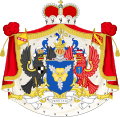Cabinet of Otto von Bismarck | |
|---|---|
| 1st Cabinet of the German Empire | |
| 1871 – 1890 | |
 Otto von Bismarck | |
| Date formed | 21 March 1871 |
| Date dissolved | 20 March 1890 (18 years, 11 months, 3 weeks and 6 days) |
| People and organisations | |
| Emperor | Wilhelm I Friedrich III Wilhelm II |
| Chancellor | Otto von Bismarck |
| Vice Chancellor | Otto zu Stolberg-Wernigerode (until 20 June 1881) Karl Heinrich von Boetticher (from 20 June 1881) |
| Member parties | Independent Supported by: National Liberal Party (until 1878; from 1884) Centre Party (1878-1884) German Progress Party (until 1878) German Conservative Party (from 1878) Free Conservative Party Imperial Liberal Party |
| Status in legislature | Majority |
| History | |
| Elections | 1871 federal election 1874 federal election 1877 federal election 1878 federal election 1881 federal election 1884 federal election 1887 federal election |
| Predecessor | n/a |
| Successor | Caprivi cabinet |
| ||
|---|---|---|
His Serene Highness Otto Eduard Leopold, Prince of Bismarck, Count of Bismarck-Schönhausen, Duke of Lauenburg Early career Legacy
| ||
The Bismarck Cabinet was the first cabinet of the German Empire, led by Otto von Bismarck from the unification of Germany in 1871 until 1890.

